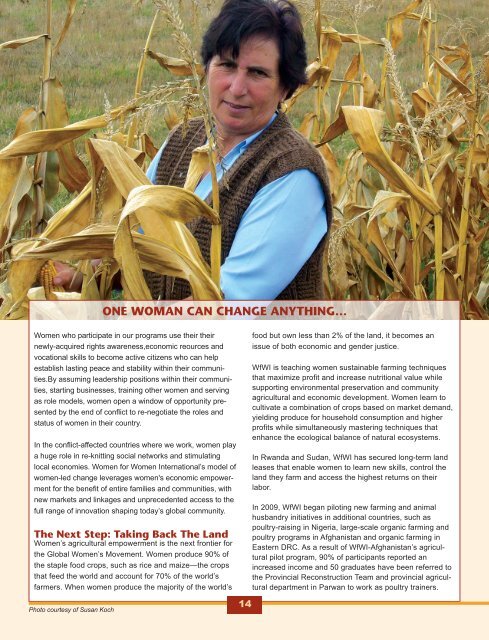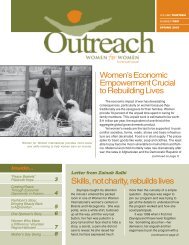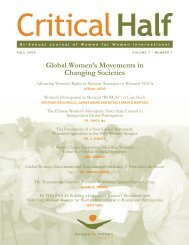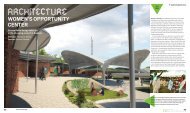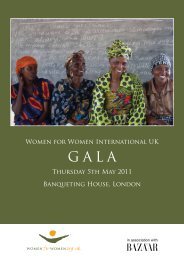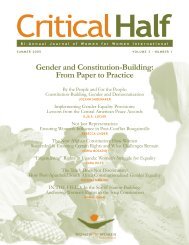2009 Annual Report - Women for Women International
2009 Annual Report - Women for Women International
2009 Annual Report - Women for Women International
You also want an ePaper? Increase the reach of your titles
YUMPU automatically turns print PDFs into web optimized ePapers that Google loves.
<strong>Women</strong> who participate in our programs use their their<br />
newly-acquired rights awareness,economic reources and<br />
vocational skills to become active citizens who can help<br />
establish lasting peace and stability within their communities.By<br />
assuming leadership positions within their communities,<br />
starting businesses, training other women and serving<br />
as role models, women open a window of opportunity presented<br />
by the end of conflict to re-negotiate the roles and<br />
status of women in their country.<br />
In the conflict-affected countries where we work, women play<br />
a huge role in re-knitting social networks and stimulating<br />
local economies. <strong>Women</strong> <strong>for</strong> <strong>Women</strong> <strong>International</strong>’s model of<br />
women-led change leverages women's economic empowerment<br />
<strong>for</strong> the benefit of entire families and communities, with<br />
new markets and linkages and unprecedented access to the<br />
full range of innovation shaping today’s global community.<br />
The Next Step: Taking Back The Land<br />
<strong>Women</strong>’s agricultural empowerment is the next frontier <strong>for</strong><br />
the Global <strong>Women</strong>’s Movement. <strong>Women</strong> produce 90% of<br />
the staple food crops, such as rice and maize—the crops<br />
that feed the world and account <strong>for</strong> 70% of the world’s<br />
farmers. When women produce the majority of the world’s<br />
Photo courtesy of Susan Koch<br />
ONE WOMAN CAN CHANGE ANYTHING…<br />
14<br />
food but own less than 2% of the land, it becomes an<br />
issue of both economic and gender justice.<br />
WfWI is teaching women sustainable farming techniques<br />
that maximize profit and increase nutritional value while<br />
supporting environmental preservation and community<br />
agricultural and economic development. <strong>Women</strong> learn to<br />
cultivate a combination of crops based on market demand,<br />
yielding produce <strong>for</strong> household consumption and higher<br />
profits while simultaneously mastering techniques that<br />
enhance the ecological balance of natural ecosystems.<br />
In Rwanda and Sudan, WfWI has secured long-term land<br />
leases that enable women to learn new skills, control the<br />
land they farm and access the highest returns on their<br />
labor.<br />
In <strong>2009</strong>, WfWI began piloting new farming and animal<br />
husbandry initiatives in additional countries, such as<br />
poultry-raising in Nigeria, large-scale organic farming and<br />
poultry programs in Afghanistan and organic farming in<br />
Eastern DRC. As a result of WfWI-Afghanistan’s agricultural<br />
pilot program, 90% of participants reported an<br />
increased income and 50 graduates have been referred to<br />
the Provincial Reconstruction Team and provincial agricultural<br />
department in Parwan to work as poultry trainers.


